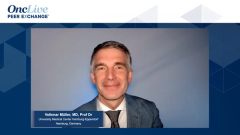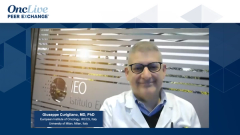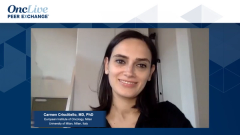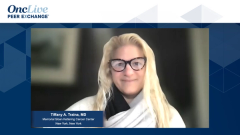
Managing TRAEs Associated With Novel HER2+ MBC Therapies
Recommendations for monitoring for and managing adverse events associated with newer therapies being sequenced into HER2+ metastatic breast cancer treatment algorithms.
Episodes in this series

Giuseppe Curigliano, MD, PhD: Dr Müller, because we have the data from the HER2CLIMB trial, what’s the new treatment algorithm for HER2 [human epidermal growth factor receptor 2]–metastatic breast cancer?
Volkmar Müller, MD, PhD:Returning to these regimens, quality of life despite survival is important. I want to address your experience and your feelings on the adverse effects of these regimens. Dr Traina, can you explain the different adverse effects of these regimens, your management, and your experience?
Tiffany A. Traina, MD:You raise an excellent point. Getting the disease under control helps our patients feel their best, but they’re on therapy for a long time, and we want to ensure that the toxicities are manageable and not impacting their health-related quality of life. Trastuzumab and pertuzumab as a combination is well tolerated. We often see pertuzumab with a GI [gastrointestinal] toxicity; that is, diarrhea or nausea that the backbone chemotherapy or taxane [paclitaxel] can contribute to. In general the trastuzumab-pertuzumab combination, incrementally, is well tolerated, but the chemotherapy adverse effects are what we’re managing with that triplet. With capecitabine and TKI [tyrosine kinase inhibitors] combinations, there’s a pill burden to manage and toxicity related to that. There is also the GI toxicity around managing diarrhea and nausea, which is more significant than with the pertuzumab. Concern around hand-foot syndrome, rash, GI toxicity, LFT [liver function test] abnormalities, and the financial burden of an oral regimen has a different structure in the United States in terms of reimbursement for patients. They may have a higher out-of-pocket cost for a full oral regimen compared with an intravenous regimen.
Moving on to newer drugs—trastuzumab deruxtecan, for example—this ADC [antibody-drug conjugate] has asthenia and fatigue associated with it. A significant adverse event that we’re aware of is interstitial lung disease or pneumonitis. In the DESTINY-Breast01 trial, that occurred about 15% to 16% of the time of all grades, but there were grade 5 fatal events related to pneumonitis, about 2% to 3%. That is significant and gives us pause. In subsequent protocols, there were strict guidelines around managing, observing, and monitoring pneumonitis. In my practice, we’re monitoring with high-resolution CT scans that we use to evaluate for response to therapy. There’s a low threshold to whole drug, even with ground-glass opacities. If anyone is symptomatic, we are not only holding drug but intervening with corticosteroid and involving our pulmonologist to support these patients. It’s a different adverse event that we need to be aware of and intervene accordingly. We discussed TDM-1 [trastuzumab emtansine], which is well tolerated, but there are often LFT abnormalities, monitoring for thrombocytopenia, and dose adjustments around thrombocytopenia.
Giuseppe Curigliano, MD, PhD: I completely agree. We experience the same adverse effects that you’ve described. Additionally, there’s ILD [interstitial lung disease], which is potentially a fatal complication. It’s important to increase awareness, and oncologists must recognize it clearly to start appropriate treatment with steroids to avoid a fatal outcome. In the DESTINY-Breast03 trial, we achieved this end point because there were no patients who died from ILD. In the real world we should be careful. We must recognize the symptoms to start an appropriate treatment as soon as possible.
Carmen Criscitiello, MD, PhD: These drugs can potentially cause adverse events, but it’s important to be familiar with potential events to recognize and manage them. In this scenario it’s important to educate both patients and physicians. The toxicity may be reduced with our experience in using the drugs. The more we use the drug, the more we become confident and experts in managing them, even with the potential of adverse events.
Volkmar Müller, MD, PhD:There’s a learning curve from study to study, and supporting that curve has to be steep.
Transcript edited for clarity.






































